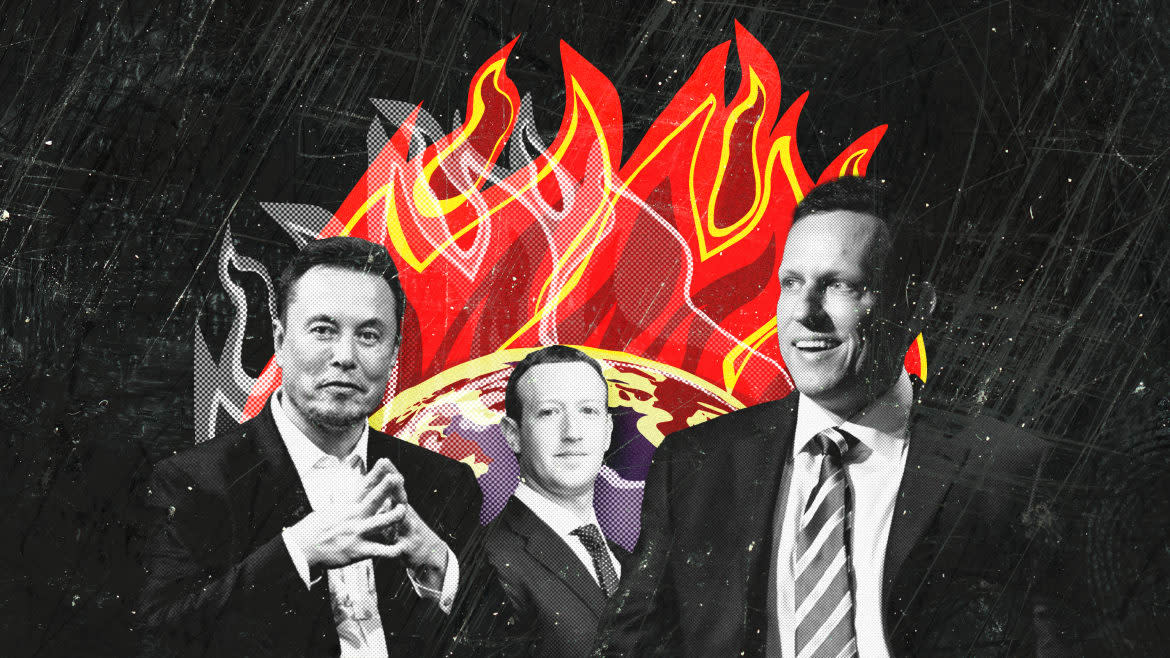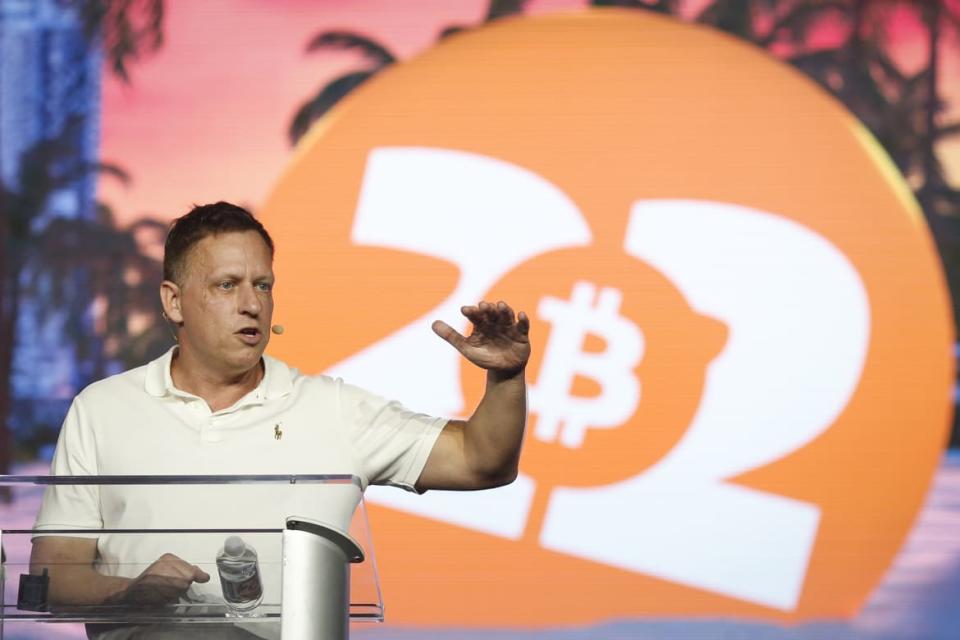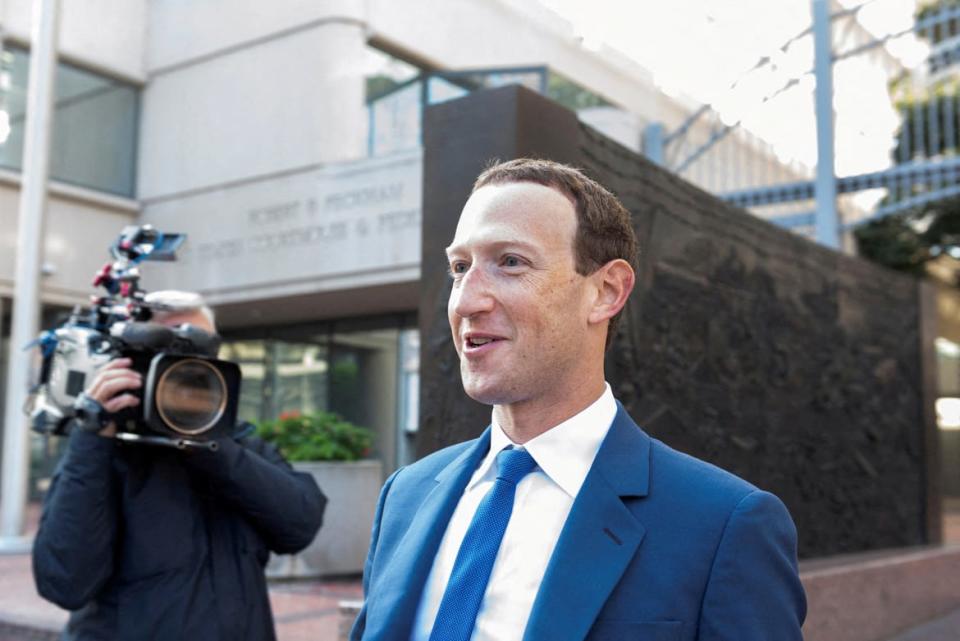Big Tech Billionaires’ Utopian Dreams Are Actually Dystopian Nightmares

- Oops!Something went wrong.Please try again later.
- Oops!Something went wrong.Please try again later.
If you thought big government was ever present, just try to escape the long arm of big tech.
In case you missed it, a group of Silicon Valley billionaires have spent around $900 million buying up thousands of acres of farmland so they can build a new city outside of San Francisco.
This was done under the veil of secrecy, which caused locals to speculate on who was really behind the mysterious purchases. According to The New York Times, “Theories had ranged from wind farms to a new Disneyland to an imagined plot involving Chinese intelligence and a new port.”
A History Lesson for the Mega-Rich Bullies Bankrolling California Land-Grab
It turns out that, instead, the purchases were spearheaded by Jan Sramek, a former Goldman Sachs whiz kid who is leading a group of prominent Silicon Valley moguls, including names like Marc Andreessen, LinkedIn co-founder Reid Hoffman, and Laurene Powell Jobs, founder of the Emerson Collective and widow of Apple co-founder Steve Jobs.
Locals are fighting back, and there is speculation they can put the kibosh on the deal. But in the near future, the availability of terra firma might not hinder tech billionaires hoping to cash in and spread their utopian visions far and wide.
Consider, for example, PayPal co-founder Peter Thiel, who backs an idea called seasteading. If you’re unfamiliar, these are “startup communities that float on the ocean with any measure of political autonomy.” According to the Seasteading Institute, these “floating cities” provide an “open space for experimenting with new societies.”

Peter Thiel, co-founder of PayPal, Palantir Technologies, and Founders Fund, speaks during the Bitcoin 2022 Conference at Miami Beach Convention Center on April 7, 2022 in Miami, Florida.
It’s just another weird, big idea coming out of big tech—an industry that never stops pushing for more.
Speaking of Thiel, he is just one of the tech billionairess (along with Elon Musk, Mark Zuckerberg, and the aforementioned Marc Andreessen) highlighted in Jonathan Taplin’s provocative forthcoming book The End Of Reality: How Four Billionaires are Selling a Fantasy Future of the Metaverse, Mars, and Crypto.
Taplin—whose résumé includes stints as tour manager for Bob Dylan and The Band, producing major films, serving as an executive at Merrill Lynch, and founding the internet’s first video-on-demand service—argues that these tech giants have designs on not just remaking America, but on remaking humanity.
As Taplin tells it, an “anarcho-libertarian” ideology has them focused on four interrelated projects: 1) creating a virtual world, a.k.a. the metaverse; 2) cryptocurrency; 3) abandoning a dying Earth for Mars; 4) transhumanism (using tech to augment and extend human life, possibly forever).
These Technocrats (as Taplin collectively calls them) come to their worldviews based, in part, on their similarities: They were introverted nerds who lacked social skills and were bullied.
As a result, they escaped their reality by delving into fantasy and science fiction. (Think this is a coincidence? It’s worth noting that the aforementioned Jan Sramek, the man behind the secretive plan to build a new city in northern California, was, as The New York Times described him, a “science fiction-obsessed teenager.”)

Meta Platforms Chief Executive Mark Zuckerberg leaves federal court in San Jose, California, on Dec. 20, 2022.
When it comes to electoral politics Musk, Andreessen, and Zuckerberg were once considered Obama progressives (Andreessen backed Obama in 2008, but switched to Mitt Romney in 2012). Taplin tells me (you can listen to our podcast conversation here) that the desire for lower taxes and less regulation helped push them rightward.
Elon Musk, Joe Rogan, and the Apocalyptic ‘Centrists’
Taplin is more politically liberal than I am, but his warnings resonate with my center-right convictions.
Unlike Burkean conservatives (who prefer slow, evolutionary reform), the Technocrats fetishize “disruption.”
The utopian dream of spending your waking life in a metaverse (because AI will have replaced most jobs) might make it easier for introverts. But it would also mean removing many of the things that we know give humans joy, such as meaningful work, friendships, community, and nature.
If you care about human flourishing, this ain’t it.
Taplin also warns that transhumanism, specifically, would undermine America’s most deeply held assumptions. “Clearly the idea that ‘all men are created equal’ would have no meaning in a transhumanist world in which wealth would determine the length of your life or the genetic attributes of your children,” Taplin writes.
As a conservative, I have long worried about the power of big government. But big tech’s domination in this scenario would be even more pervasive, and likely less responsive.
In some ways, these tech billionaires are already starting to supplant our government, partly because our government has retreated from big projects like space. Consider, for example, Ronan Farrow’s recent reporting on how the U.S. government came to rely on Elon Musk.
As Jim Bridenstine, former NASA administrator and GOP congressman from Oklahoma, told Farrow, “There is only one thing worse than a government monopoly. And that is a private monopoly that the government is dependent on. I do worry that we have put all of our eggs into one basket, and it’s the SpaceX basket.”
Free market conservatives ostensibly believe in competition; Thiel believes that “Competition is for losers.” The Technocrats don’t want a free market. They want a rigged market.
According to Taplin, “the internet tends always toward monopoly” due to Metcalf’s law, which essentially says that once a social network reaches a critical mass in a certain area, users have too much to lose to flee it, and so it skews toward a winner-take-all paradigm. What is more, many of the old rules and regulations that formerly prevented terrestrial media consolidation went out the window with the internet age.
California Farm Committee Nixed Just as Tech Tycoons Began Land-Grab
Taplin goes out of his way to stress that deregulation was a bipartisan project, these last forty, or so, years. But as a conservative who has long been skeptical of big government, I am coming to believe that confronting the rise of the Technocrats may necessitate a Theodore Roosevelt-like figurehead to rein in this threat—that may very well eclipse the threat of big government.
Maybe it won’t come to that. While Taplin lists an assortment of public policy reforms to prevent the culmination of this brave new world, he also advises individuals who wants to join the “resistance” to 1) refuse to buy a VR headset for their kids; 2) refuse to buy cryptocurrency or NFTs; 3) refuse to buy “life-extension therapies”; and 4) refuse to allow their tax dollars to “finance a Mars space colony.”
If you’ve ever noticed the way that technology insidiously captivates humans (try leaving the house sometime without your iPhone or insisting that your 12-year-old child spend less time obsessed with his “screen”), you’ll also realize that once average Americans are hip to a technological trend, it’s already too late to stop it.
Whether they’re coming for your job, your soul, or your farmland, it won’t be easy to stop these big tech billionaires from ending reality as we know it.
Get the Daily Beast's biggest scoops and scandals delivered right to your inbox. Sign up now.
Stay informed and gain unlimited access to the Daily Beast's unmatched reporting. Subscribe now.
